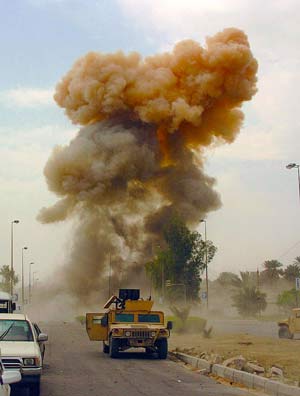
Stories about armed fanatics and lone wolf gunmen fill the headlines and compete for our shocked attention. In an article for Slate, Andrew Mack and Steven Pinker demonstrate that society is not in fact falling apart.
Judging from the recent news cycle, it would seem that order in our world is unraveling at a frantic pace. Stories about armed fanatics and lone wolf gunmen fill the headlines and compete for our shocked attention. In an article for Slate titled, The World is Not Falling Apart Andrew Mack, director of the Human Security Report Project, and Steven Pinker, author of The Better Angels of Our Nature, demonstrate that society is not in fact falling apart. As horrific as recent events have been, they are not the norm. In fact, despite the flurry of media reports claiming otherwise, the data actually shows that the world is getting less violent.
"An evidence-based mindset on the state of the world would bring many benefits," Mack and Pinker write.
"It would calibrate our national and international response to the magnitude of the dangers that face us. It would limit the influence of terrorists, school shooters, decapitation cinematographers, and other violence impresarios. It might even dispel foreboding and embody again hope of the world."
Large Scale Wars Have Declined 40% Globally
 According to Mack, large scale wars have declined 40% globally since the end of the Cold War in the early 1990s and current research suggests that armed conflict could all but disappear in the 21st Century.
According to Mack, large scale wars have declined 40% globally since the end of the Cold War in the early 1990s and current research suggests that armed conflict could all but disappear in the 21st Century.
"Not necessarily in one fell swoop but bit by bit, we nibble away at sources of violence in different categories. For those reasons, I don't think it's a fluke and I don't think it is at all romantic to think that this century could put an end to major kinds of war and drastically reduce the toll of minor forms of war," said Pinker recently at Conversations on Conflict, an event hosted by the One Earth Future Foundation.
While it is true that there has been a recent uptick in global conflict, Mack, a fellow at One Earth Future, attributes it to one factor and claims that it is not indicative of the overall trends.
"Since about 2007 we've seen an increase in high intensity wars around the world and this won't come as any surprise to people who read the newspapers and read about Afghanistan, Iraq, Syria, Pakistan, Yemen, Somalia, and so forth. Nearly all of these high intensity wars are wars in which radical Islamic groups like ISIS in Syria and Iraq, like Al Qaeda, have been responsible. If we ignore the ISIS and Al Qaeda groups then we find that the trend of non-Islamist wars is going down. We have good news on non-Islamic wars and bad news on Islamic wars."
The threat is real, but according to Mack and Pinker, this spike in violence is small in comparison to the decline that proceeded it, and it is unlikely to escalate. What we should be fighting is the hyperbolic journalistic narration that "the world is 'more dangerous than it has been' even though the majority of humanity lives in peace and dies of old age."
Article Details
Published
Topic
Program
Content Type
In the media